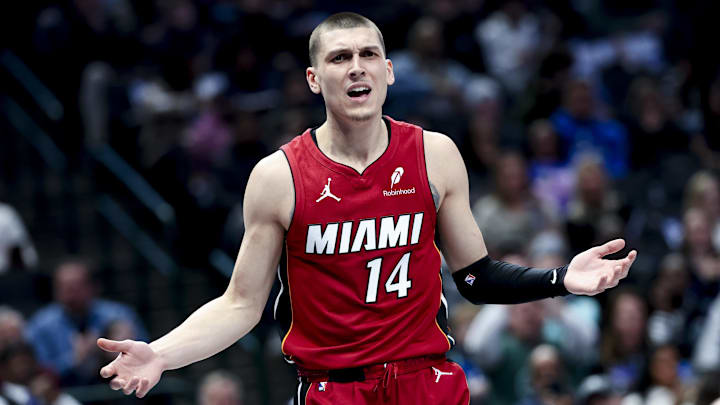The Miami Heat’s pursuit of another star is among the most frequently discussed topics across the NBA lexicon. Most of the time, these conversations dance around what should be clearly, if painfully, obvious: Landing another big name is almost assuredly going to require that Pat Riley and the rest of the front office part with Tyler Herro.
This harsh reality is hinted at in the presumed stance on Herro’s extension eligibility. Beginning in October, he can sign a three-year deal worth up to $150 million. Hardly anybody expects him to get that much, or even extension at all.
Paying him eats into Miami’s projected cap flexibility in 2027, when as of now, it can carve out north of $90 million. But forgoing a Herro extension isn’t just about that. Nor is it about the complications of evaluating him in the aftermath of his recent ankle surgery.
It’s about keeping him trade-eligible—and also ensuring he remains someone for whom teams want to actually trade.
The Heat probably can’t get a superstar without moving Tyler Herro
Superstar-trade packages do not have an exact formula, but they tend to follow one of two blueprints: Either they feature mountains of draft capital, or they are headlined by a young-ish blue-chip player and more modest amounts of first-round picks.
Miami does not have the draft equity necessary to get by on draft selections and filler alone. It can only trade up two first-rounders this season. And though this number increases to four over the summer, that still won’t be enough to complete deals for top-tier stars. Desmond Bane just fetched five first-round picks (four outright, and one swap), and he’s never made an All-Star game.
Outgoing salary will need to be part of the value Miami sends out. That’s a problem, too. It has contracts to match money, but soon-to-be-rebuilding teams won’t trip over themselves for Terry Rozier’s expiring deal, or Andrew Wiggins’ contract (2026-27 player option).
Herro, on the other hand, is a 25-year-old All-Star. He is someone who should pique other teams’ attention. The question is: Will he?
Tyler Herro’s trade value is complicated
Stigmas against guards who aren’t floor generals and can’t play minutes at the 3 have reached an all-time high. Guys like Cam Thomas, Collin Sexton, Anfernee Simons, Jalen Green, and more have failed to net lucrative long-term deals, or bring back a ton of assets in trades.
To be sure, Herro is better than all of them. What that means for his trade value remains to be seen. He wasn’t coveted by the Portland Trail Blazers in Damian Lillard negotiations on his current deal. While he has proven a lot since then, it’s not like we’re hearing rampant rumors about how much teams want him.
Which brings us back to his extension. If he’s a spotty trade asset now, the Heat can’t afford to sign him to another deal that undermines whatever market appeal he does have. He could technically become more valuable on the right extension, but that requires a very specific set of terms. And even then, we have to ask: Who’s the team banging down Miami’s door to offer multiple firsts for him?
No matter how you slice it, the Heat still wind up in the same spot: Their pursuit of that next star hinges not only on a willingness to move Herro, but on other teams assigning premium value to his services.
